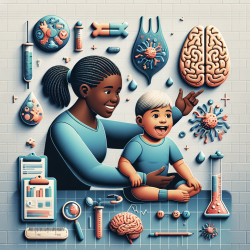Introduction
As a practitioner in the field of special education and therapy, staying updated with the latest research is crucial for improving your skills and providing the best care for your students. The research article "Behavioral and Psychiatric Disorders in Syndromic Autism" provides valuable insights into the genetic underpinnings and behavioral manifestations of syndromic autism, which can be instrumental in shaping your therapeutic approaches.
Understanding Syndromic Autism
Syndromic autism refers to autism spectrum disorder (ASD) diagnosed in conjunction with a known genetic syndrome. This condition is characterized by genetic mutations or defects that significantly elevate the risk of developing ASD. The research highlights the importance of recognizing behavioral phenotypes associated with these genetic syndromes, which can guide clinicians in identifying potentially treatable conditions.
Key Insights from the Research
The research identifies several classical genetic syndromes frequently associated with ASD, including:
- Fragile X Syndrome
- Tuberous Sclerosis Complex
- Phelan–McDermid Syndrome
- Prader–Willi Syndrome
- Angelman Syndrome
Each of these syndromes presents unique behavioral and psychiatric challenges, making it essential for practitioners to understand their specific characteristics and associated genetic markers.
Implementing Research Outcomes in Practice
To improve your practice, consider the following strategies based on the research findings:
- Genetic Testing: Utilize genetic testing to confirm diagnoses and tailor interventions. This can include targeted genetic testing for specific mutations associated with syndromic autism.
- Behavioral Phenotype Identification: Focus on identifying behavioral phenotypes as part of the broader neurodevelopmental presentation. This can aid in creating personalized intervention plans.
- Collaboration with Geneticists: Work closely with geneticists to interpret genetic testing results and integrate them into treatment planning.
- Continued Education: Stay informed about advances in genomic technology and next-generation sequencing to enhance diagnostic accuracy and intervention strategies.
Encouraging Further Research
The research underscores the need for continued exploration of the genetic and behavioral aspects of syndromic autism. Practitioners are encouraged to engage in further research to deepen their understanding and contribute to the development of effective therapeutic interventions.
Conclusion
By integrating the insights from this research into your practice, you can enhance your ability to support students with syndromic autism effectively. Understanding the genetic and behavioral complexities of these conditions is key to providing personalized and impactful therapy.
To read the original research paper, please follow this link: Behavioral and Psychiatric Disorders in Syndromic Autism.










